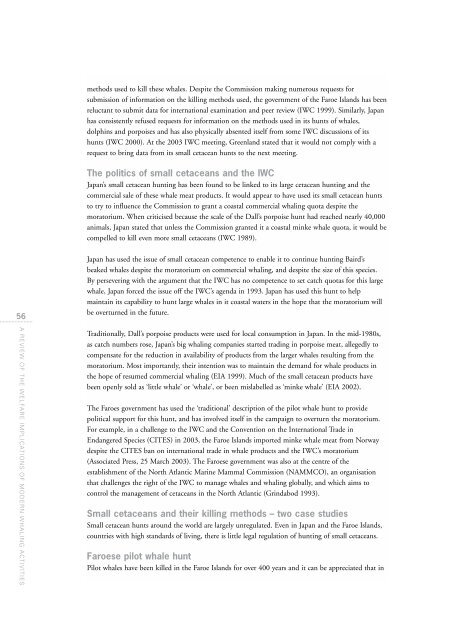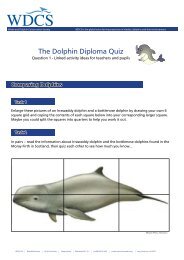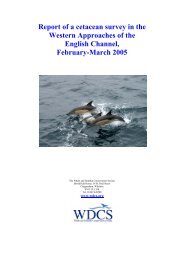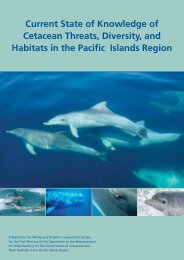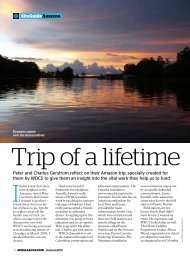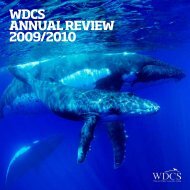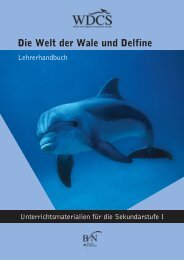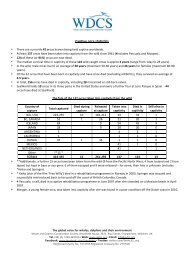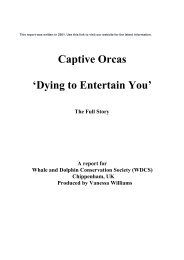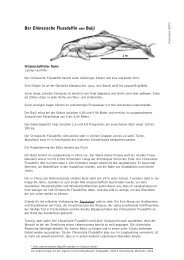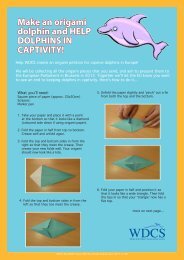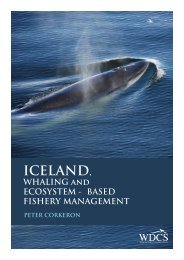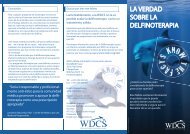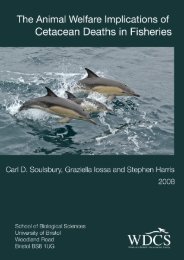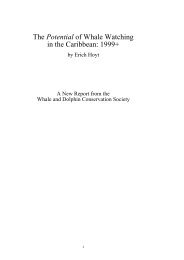TROUBLED WATERS - Whale and Dolphin Conservation Society
TROUBLED WATERS - Whale and Dolphin Conservation Society
TROUBLED WATERS - Whale and Dolphin Conservation Society
Create successful ePaper yourself
Turn your PDF publications into a flip-book with our unique Google optimized e-Paper software.
56<br />
A REVIEW OF THE WELFARE IMPLICATIONS OF MODERN WHALING ACTIVITIES<br />
methods used to kill these whales. Despite the Commission making numerous requests for<br />
submission of information on the killing methods used, the government of the Faroe Isl<strong>and</strong>s has been<br />
reluctant to submit data for international examination <strong>and</strong> peer review (IWC 1999). Similarly, Japan<br />
has consistently refused requests for information on the methods used in its hunts of whales,<br />
dolphins <strong>and</strong> porpoises <strong>and</strong> has also physically absented itself from some IWC discussions of its<br />
hunts (IWC 2000). At the 2003 IWC meeting, Greenl<strong>and</strong> stated that it would not comply with a<br />
request to bring data from its small cetacean hunts to the next meeting.<br />
The politics of small cetaceans <strong>and</strong> the IWC<br />
Japan’s small cetacean hunting has been found to be linked to its large cetacean hunting <strong>and</strong> the<br />
commercial sale of these whale meat products. It would appear to have used its small cetacean hunts<br />
to try to influence the Commission to grant a coastal commercial whaling quota despite the<br />
moratorium. When criticised because the scale of the Dall’s porpoise hunt had reached nearly 40,000<br />
animals, Japan stated that unless the Commission granted it a coastal minke whale quota, it would be<br />
compelled to kill even more small cetaceans (IWC 1989).<br />
Japan has used the issue of small cetacean competence to enable it to continue hunting Baird’s<br />
beaked whales despite the moratorium on commercial whaling, <strong>and</strong> despite the size of this species.<br />
By persevering with the argument that the IWC has no competence to set catch quotas for this large<br />
whale, Japan forced the issue off the IWC’s agenda in 1993. Japan has used this hunt to help<br />
maintain its capability to hunt large whales in it coastal waters in the hope that the moratorium will<br />
be overturned in the future.<br />
Traditionally, Dall’s porpoise products were used for local consumption in Japan. In the mid-1980s,<br />
as catch numbers rose, Japan’s big whaling companies started trading in porpoise meat, allegedly to<br />
compensate for the reduction in availability of products from the larger whales resulting from the<br />
moratorium. Most importantly, their intention was to maintain the dem<strong>and</strong> for whale products in<br />
the hope of resumed commercial whaling (EIA 1999). Much of the small cetacean products have<br />
been openly sold as ‘little whale’ or ‘whale’, or been mislabelled as ‘minke whale’ (EIA 2002).<br />
The Faroes government has used the ‘traditional’ description of the pilot whale hunt to provide<br />
political support for this hunt, <strong>and</strong> has involved itself in the campaign to overturn the moratorium.<br />
For example, in a challenge to the IWC <strong>and</strong> the Convention on the International Trade in<br />
Endangered Species (CITES) in 2003, the Faroe Isl<strong>and</strong>s imported minke whale meat from Norway<br />
despite the CITES ban on international trade in whale products <strong>and</strong> the IWC’s moratorium<br />
(Associated Press, 25 March 2003). The Faroese government was also at the centre of the<br />
establishment of the North Atlantic Marine Mammal Commission (NAMMCO), an organisation<br />
that challenges the right of the IWC to manage whales <strong>and</strong> whaling globally, <strong>and</strong> which aims to<br />
control the management of cetaceans in the North Atlantic (Grindabod 1993).<br />
Small cetaceans <strong>and</strong> their killing methods – two case studies<br />
Small cetacean hunts around the world are largely unregulated. Even in Japan <strong>and</strong> the Faroe Isl<strong>and</strong>s,<br />
countries with high st<strong>and</strong>ards of living, there is little legal regulation of hunting of small cetaceans.<br />
Faroese pilot whale hunt<br />
Pilot whales have been killed in the Faroe Isl<strong>and</strong>s for over 400 years <strong>and</strong> it can be appreciated that in


